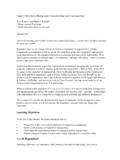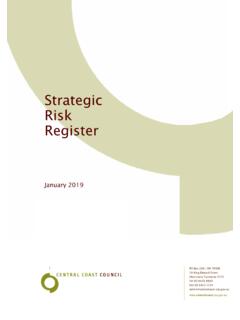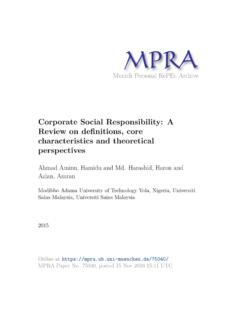Transcription of ETHICS IN BRANDING
1 Post PrintThis article is a version after peer-review, with revisions having been made. In terms of appearance only this might not be the same as the published article. ETHICAL BRANDING AND corporate reputation corporate Communications: An International Journal, Volume 10, Number 4, 2005 , pp. 341-350(10) Ying Fan Department of Marketing University of Lincoln Brayford Pool Lincoln LN6 7TS ENGLAND 44-1522-886345 Key Words corporate brand, BRANDING , brand equity, corporate reputation , CSR, marketing ETHICS ETHICAL BRANDING AND corporate reputation Abstract This paper explores the concept of ethical BRANDING and its link to corporate reputation . Brands have traditionally been studied only as an economic construct. Brands, as a social construct, have not yet been fully understood due to the lack of research. A corporate brand is a vital part of the corporate reputation management.
2 An ethical brand enhances the firm s reputation ; such a reputation reinforces the brand in turn. On the other hand, any unethical behaviour will severely damage or even destroy the total intangible asset as evidenced by the recent high profile corporate scandals. Ethical BRANDING could provide the company with a differential advantage as a growing number of consumers become more ethically conscious. Introduction There has been a growing research interest in the area of business and marketing ETHICS . ETHICS has been studied in almost all business issues except BRANDING . Not a single academic study has been found on BRANDING ETHICS after an extensive literature search covering the following sources: three online database (ABI Inform Global, Ebsco and Infotrac), three journals (Journal of Business ETHICS , Journal of Brand Management and Journal of Product and Brand Management), dozens of books and websites.
3 Brands may have been in existence for well over a thousand years. But never has any society before seen the power of BRANDING as is witnessed today: Brands are prevalent in every aspect of human life: production and consumption, food and clothing, personality and lifestyle; and from pop culture to politics. BRANDING is no longer just about adding value to a product; BRANDING represents and promotes lifestyles and brands themselves become a kind of culture. In the words of Hazel Kahan (quoted in Hall, 1999), brands are now gunning for a share of consumers inner lives, their values, their beliefs, their politics; yes, their souls. The impact of brands and BRANDING 1is far beyond the field of marketing and advertising. BRANDING is a social construct as well as an economic construct. As an economic construct, brands have been studied from both marketing and financial perspectives.
4 As a social construct, brands have not yet been fully understood owing to the dearth of academic research in this area. Advertising is probably the most visible element of marketing but BRANDING is at the centre of any marketing communications. Most problems with advertising have their roots in BRANDING strategy. A notorious example is Benetton s shocking tactic advertising in the 1990s. However, little is known about the impact of BRANDING (not advertising) on the stakeholders other than brand owners and users, and about the link between BRANDING and corporate reputation . This paper aims to raise the awareness of ethical issues in corporate BRANDING . What Is Ethical BRANDING ? Brand is a simple but very confused word with multiple meanings. The American Marketing Association defines a brand as: a name, term, sign, symbol, or design, or a combination of them, intended to identify the goods or services of one seller or group of sellers and differentiate them from those of competitors (Kotler, 2003).
5 A brand may have many other meanings depending on the role it plays, the value it has and more importantly, to whom it is related. To brand owners, a brand is mainly a differentiation device: the living memory and the future of its products (Kapferer, 1997). To brand users, a brand may create an emotional bond with them which turns the brand into an icon. In the most developed role, brands represent not only the products or services a company provides but the firm itself, the brand is the company and brands become a synonym of the company s policy (Goodyear 1996; de Chernatony and McDonald, 2003). A brand is no longer just the interface between the 2company and its customers; to whom and to the general public, it is the face of the company. BRANDING is a key function in marketing that means much more than just giving a product a name.
6 BRANDING at corporate level is essentially about developing and managing the relationship between the organisation and its various stakeholders as well as the general public. Should BRANDING be ethical? It might seem that the answer is obvious: most companies would answer yes. However, it would be more difficult to find a universal agreement on what ethical BRANDING is. ETHICS refers to moral rules or principles of behaviour for deciding what is right and wrong. These principles are not always easy to define as a) it is often difficult to distinguish between ETHICS and legality; b) ethical values vary between individuals and organisations, and between different cultures; and they are changing over time. ETHICS is a very complex subject. Marketing ETHICS is but a subset of business ETHICS which itself is a subset of ETHICS (Martin, 1985). Research on marketing ETHICS has so far been confined to general marketing issues, such as product safety, pricing, advertising and marketing research (Laczniak, 1993; Simith, 1995 and Murphy, 1999); little attention has been paid to BRANDING .
7 No business ETHICS books have been found to have reference to BRANDING while leading BRANDING texts have made no reference to ETHICS (Aaker, 1991; Kapferer, 1997; Keller, 1998 and de Chernatony and McDonald, 2003). A brand may be amoral, but there are ethical issues in BRANDING . Ethical BRANDING , as a subset of ethical marketing, relates to certain moral principles that define right and wrong behaviour in BRANDING decisions. A brand needs to be evaluated not just by the economic or financial criteria but also by the moral ones. An ethical brand should not harm public good; instead it should contribute to or help promote public good. 3 Questionable BRANDING Objectives With the continuous advancement of technology, most consumer products have become a kind of commodity, there are fewer and fewer genuine and tangible differences between competing offers.
8 The Unique Selling Proposition (USP) is no longer valid and being replaced by so called the Emotional Selling Proposition (Aitchison, 1999:42). This provides brand advertisers with a powerful tool to manipulate the consumer s emotion in order to achieve brand differentiation. The conventional wisdom of BRANDING believes that the ultimate aim of BRANDING is to command a favourable position in the mind of consumers, distinct from competition (Ries and Trout, 1982). A successful brand is believed to bring its owner great financial value in terms of either higher sales or premium prices. The ultimate objectives in BRANDING can be summarised as follows: To dominate the market (to reduce or eliminate competition) To increase customer loyalty (by increasing the switch cost) To raise the entry barriers (to fend off potential threat) These BRANDING objectives could be ethically questionable under scrutiny.
9 Whilst there may be nothing wrong if one brand succeeds in dominating the market, it is a different matter if the brand aims at monopoly with active attempt to eliminate competition as in the recent case of Microsoft, which was imposed a record 497 million fine by the EU for anti-competitive behaviour. As a human activity BRANDING should be evaluated from a moral point of view. In the ruthless competition for market shares moral issues are probably the last concern for companies. The paradox is that the more successful a brand is in the marketplace, the more likely its BRANDING strategy may become ethically questionable. Consider the following cases: Targeting at children as young as five years old who are impressionable; Alcoholic soft drink advertising encouraging under-age drinking; 4 Exaggerating non-existing benefits in a basically commodity product; False and misleading advertising; Promoting self-indulgence and conspicuous consumption ( binge drinking and consumer debts) A Vulnerable Asset The image of a brand can also be affected by non- BRANDING decisions that are made at the marketing or business level, for example, sweatshop accusations, animal testing, labour disputes, etc.
10 Most business decisions that might eventually affect the organisation s brand image are made by people other than the brand manager on financial criteria with little consideration for ethical issues. Whenever anything goes wrong, be it a small incident or a big crisis, it is the brand that takes the blame; the brand image and corporate reputation are always the victim. Brands became the mistaken identity in the debate between No Logo and Pro Logo camps (The Economist, 08/09/2001), as it is not the brand or logo, but the bad corporate policies that are responsible for all the wrongdoings. Brands are not guilty of social and environmental damage nor are they even a symbol of unethical working practice Corporations are guilty and laws that allow unethical practice are guilty (anonymous comment on 29/10/2001).













